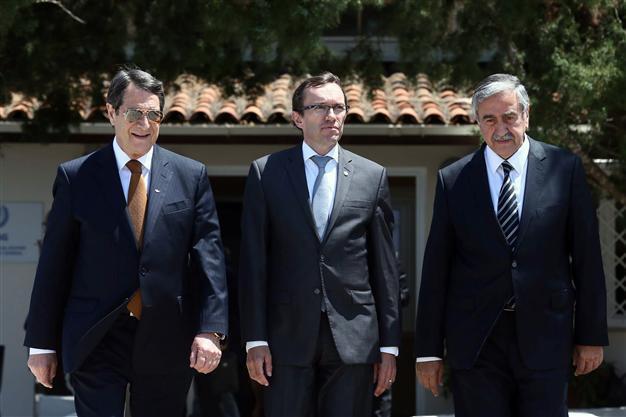Cyprus peace talks resume with confidence-building measures
NICOSIA - Reuters

AFP Photo
U.N.-sponsored talks resumed on May 15 after an eight-month stalemate with Greek and Turkish Cypriot leaders agreeing to adopt confidence-building measures, in a new drive to settle the island’s decades-old conflict.Greek Cypriot leader Nicos Anastasiades and his newly-elected Turkish Cypriot counterpart Mustafa Akıncı agreed to the measures in parallel to meeting at least twice a month, U.N. mediator Espen Barth Eide said.
“They shared their vision for a united Cyprus,” Eide told journalists after talks which lasted almost four hours.
In a goodwill gesture, Turkish Cypriot authorities would no longer require Greek Cypriots to fill in visa forms at crossing points to northern Cyprus, Eide said.
He said Anastasiades had given coordinates of minefields laid by Greek Cypriots before 1974 which are now in Turkish Cypriot territory.
Thousands of people cross daily through seven checkpoints along a buffer zone across the island. Dropping the visa forms is expected to ease bottlenecks at checkpoints.
Cyprus was split in 1974.
“I wish ... for the good of both communities,” Akıncı said on Twitter before the talks.
“I hope today will be the beginning of a bright future for all Cypriots and for our country,” Anastasiades tweeted.
The meeting on May 15 was held in a United Nations compound in the Cypriot capital Nicosia, within view of a crumbling airport terminal abandoned in fierce fighting in 1974.
On the basis of previous agreements, a reunification deal would create a two-state federation, one Greek Cypriot and the other Turkish Cypriot.
Talks have in the past foundered on the competencies of each, the redrawing of territorial boundaries and property claims by tens of thousands of internally-displaced people.
“We want this issue to be resolved as soon as possible within the UN’s framework of negotiations. We also expect 2015 to be the year of resolution, because the U.N. has run negotiations like this several times before,” said Turkish Foreign Ministry spokesman Tanju Bilgiç.
The last major push on Cyprus collapsed in 2004, when Greek Cypriots rejected a U.N. reunification blueprint accepted by Turkish Cypriots.
















